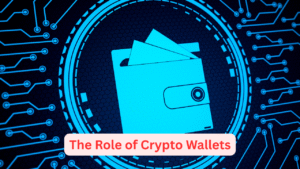 🔐 The Role of Crypto Wallets: Custodial vs Non-Custodial Explained
🔐 The Role of Crypto Wallets: Custodial vs Non-Custodial Explained
Choosing the Right Wallet for Your Crypto Journey
Crypto wallets aren’t just digital piggy banks—they’re the access point to the blockchain, the key to your tokens, and the guardian of your decentralized identity. Whether you’re a beginner or seasoned trader, understanding the difference between custodial and non-custodial wallets is essential for making informed and secure decisions.
In this article, we’ll break down:
- How crypto wallets work
- Custodial vs non-custodial wallet structures
- Pros and cons of each
- Real-world examples
- How to choose the right wallet for your needs
🧠 What are Crypto Wallets?
At its core, a crypto wallet stores your private keys—the cryptographic credentials that prove ownership of your coins on the blockchain. Contrary to popular belief, wallets don’t store the actual crypto; they store the access credentials that allow users to interact with decentralized networks.
There are two primary wallet types:
- Custodial Wallets – You trust a third party to hold your keys
- Non-Custodial Wallets – You control your keys and funds directly
This distinction forms the basis of “not your keys, not your crypto”, a popular phrase among blockchain purists.
📦 Custodial Wallets: Convenience Comes First
Custodial wallets are offered by centralized platforms such as crypto exchanges (e.g., Coinbase, Binance) or fintech apps like PayPal and Robinhood.
✅ Benefits
- Ease of use: Great for beginners, with simple interfaces
- Account recovery: Lost passwords can be reset
- Customer support: Issues are handled via help desks
❌ Drawbacks
- You don’t own the private keys
- Funds can be frozen or lost if the platform gets hacked or goes bankrupt
- Less privacy and decentralization
Real-World Example:
In 2022, users of FTX (a custodial platform) lost access to their funds during its collapse. Even though they held assets, the centralized structure meant users had no control over recovery once the platform failed.
🔢 Crypto Wallets: Sample Comparison Table
| Feature | Custodial Wallet |
|---|---|
| Control of Private Keys | No — held by third party |
| Recovery Options | Yes — password/email recovery |
| Accessibility | High — easy login via web or app |
| Security Risks | Platform hacks, data breaches |
| Decentralization | Low — centralized authority involved |
🔓 Non-Custodial Wallets: You Own Your Crypto
Non-custodial wallets give users complete control over their assets. Examples include MetaMask, Trust Wallet, and hardware wallets like Ledger or Trezor.
✅ Benefits
- Full ownership of assets
- Private keys stay with you
- Higher decentralization
- No reliance on third-party policies
❌ Drawbacks
- Responsibility is on the user
- If you lose your seed phrase, your funds may be gone forever
- Less beginner-friendly interfaces
🔢 Sample Comparison Table
| Feature | Non-Custodial Wallet |
|---|---|
| Control of Private Keys | Yes — user owns them |
| Recovery Options | No — only via seed phrase |
| Accessibility | Moderate — depends on wallet type |
| Security Risks | Human error (lost keys, phishing) |
| Decentralization | High — no third-party interference |
🔍 Examples of Popular Wallets
| Wallet Name | Type | Notable Features |
|---|---|---|
| Coinbase Wallet | Custodial | Easy login, fiat integration |
| MetaMask | Non-Custodial | Ethereum-focused, Web3 dApp access |
| Ledger Nano X | Non-Custodial | Offline (cold) storage, secure chip tech |
| Trust Wallet | Non-Custodial | Mobile-friendly, multichain support |
| Binance Wallet | Custodial | Fast trading, staking options |
Tip: Always verify wallet reviews and updates before downloading or connecting to dApps.
🎯 Crypto Wallets: Which Wallet Is Right for You?
Here’s a simplified decision matrix:
| Scenario | Recommended Wallet Type |
|---|---|
| You’re new to crypto and want simplicity | Custodial |
| You prioritize security and control | Non-Custodial |
| You trade daily on exchanges | Custodial (for convenience) |
| You invest long term and want self-custody | Non-Custodial (hardware) |
| You use DeFi and dApps | Non-Custodial (MetaMask) |
🔐 Security Tips for Any Wallet Type
No matter your wallet choice, these practices boost security:
- Use strong passwords and enable 2FA
- Safeguard your seed phrase offline
- Don’t click unknown links—phishing is rampant
- Update wallet software regularly
- Consider hardware wallets for long-term holding
🧭 Conclusion: Your Crypto, Your Choice
Custodial wallets offer ease and familiarity, but come with centralized risks. Non-custodial wallets grant full ownership—if you’re ready to handle the responsibility. There’s no universally “right” option, but understanding the trade-offs is key to avoiding loss, confusion, or scams.
In the rapidly evolving crypto space, choosing your wallet wisely is one of the most foundational decisions you’ll make. Whether it’s staking tokens, trading NFTs, or simply holding digital assets, your wallet isn’t just a tool—it’s your gateway to Web3.